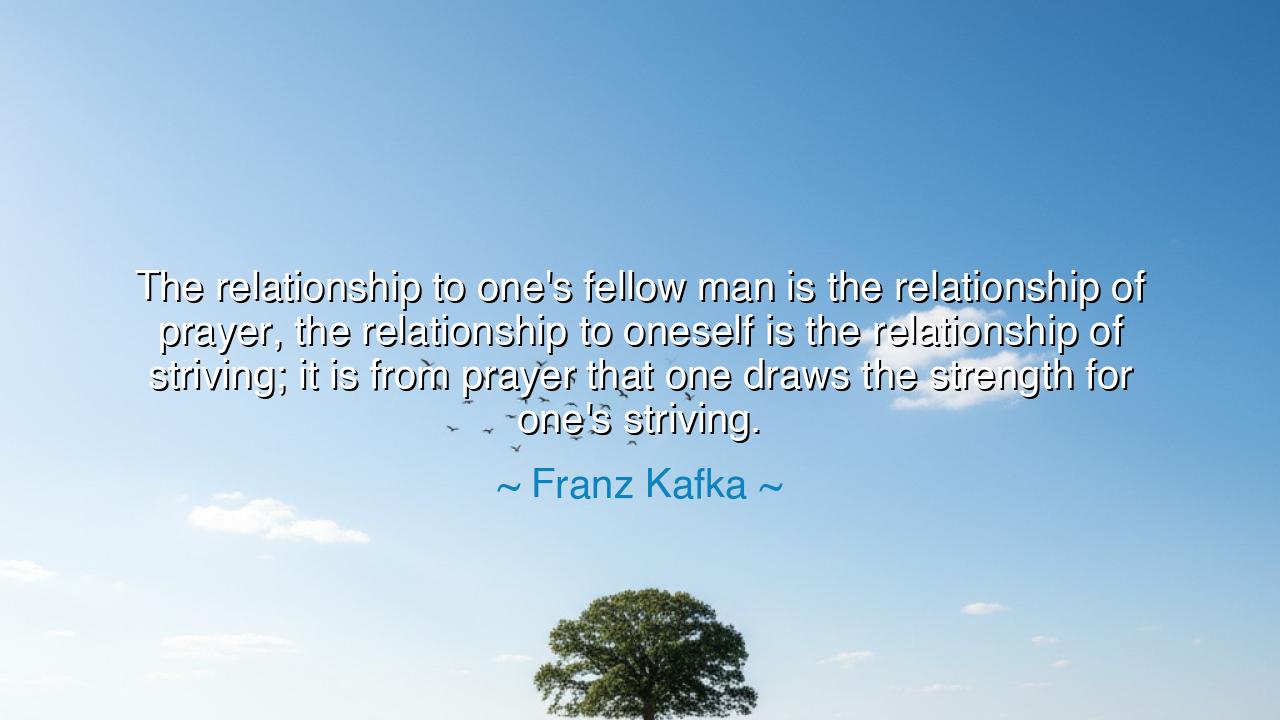
The relationship to one's fellow man is the relationship of
The relationship to one's fellow man is the relationship of prayer, the relationship to oneself is the relationship of striving; it is from prayer that one draws the strength for one's striving.






The words of Franz Kafka strike like a hidden bell in the heart of the seeker: “The relationship to one’s fellow man is the relationship of prayer, the relationship to oneself is the relationship of striving; it is from prayer that one draws the strength for one’s striving.” In these words lies the paradox of human existence: that we are bound to others in humility and reverence, but bound to ourselves in ceaseless labor. To live fully, one must hold both—prayer for others, and striving within—as two wings of the same bird. Without one, the soul cannot rise.
Prayer is here not simply ritual, but the sacred posture of openness toward one’s fellow beings. It is to approach another not with conquest or manipulation, but with reverence, as one stands before the divine. To see one’s neighbor as a mystery, as sacred, as deserving of honor—this is prayer in its deepest sense. Kafka, often tormented by the solitude of his inner world, understood that the act of turning toward another in humility and compassion was itself a form of worship, a recognition of the eternal spark within them.
But to turn inward is a different path. Toward the self, the posture must be striving. For the self is not a temple to admire, but a wilderness to conquer, a mountain to climb, a clay to mold. Within each person lies pride, fear, sloth, and despair. To live with integrity, one must wrestle with these forces, shaping the inner self with the same discipline a blacksmith uses to shape iron. This striving is relentless, demanding vigilance, effort, and courage. It is the ceaseless battle against complacency, and it cannot be avoided.
Yet Kafka teaches that striving alone is insufficient. To fight oneself without prayer is to draw water from an empty well, to wrestle endlessly without renewal. The soul grows weary when it battles without pause. Thus, the strength for striving is not found in the self but in the sacred relationship with others—the reverence, compassion, and humility that come from prayer. It is in lifting one’s gaze to the divine reflected in others that one finds energy to return to the furnace of self-discipline.
History bears witness to this truth. Consider the life of Mother Teresa, who spent her days in tireless service to the poorest and sickest. Her work was grueling, her inner battles with doubt and despair fierce. Yet she drew her strength not from herself alone, but from hours of prayer, from seeing in each suffering face the image of God. Her prayer gave her the power to continue her striving—without it, even her immense compassion would have faltered. Her life is a living illustration of Kafka’s teaching.
The lesson for us is this: do not live as though your life were only outward or only inward. If you face only others without cultivating the self, you become shallow and unsteady. If you strive only within without reverence for others, you grow weary, hardened, and alone. The balance of life is to kneel in prayer before others and to stand in striving before yourself, drawing from the first the strength to endure the second.
Practical action lies before you. Each day, practice prayer—whether in silence, in service, in kindness, or in reverent attention to another’s soul. And each day, practice striving—setting discipline for your thoughts, mastering your desires, shaping your character. Let these two acts be your rhythm: prayer as your breath, striving as your heartbeat. Together, they will give you the endurance to walk the long road of life with both humility and courage.
So let Kafka’s words endure as counsel for generations: the soul must bend in prayer, and the soul must rise in striving. From one flows compassion, from the other, discipline. And when the two are joined, man becomes whole—rooted in reverence, yet lifted by the strength that carries him through every storm.






AAdministratorAdministrator
Welcome, honored guests. Please leave a comment, we will respond soon